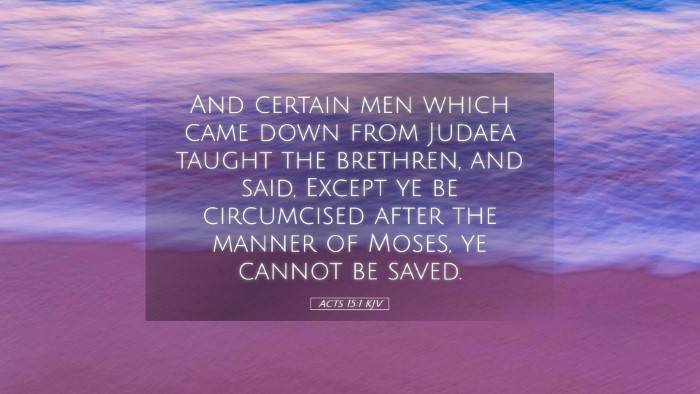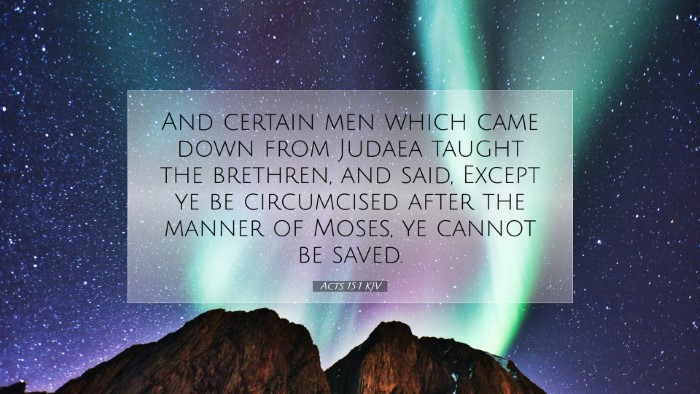Commentary on Acts 15:1
Acts 15:1 states: "And certain men which came down from Judaea taught the brethren, and said, Except ye be circumcised after the manner of Moses, ye cannot be saved." This verse introduces significant theological discussions among the early church regarding salvation and the requirements imposed on Gentile believers.
Contextual Analysis
The first verse of Acts 15 sets the stage for what is often referred to as the Jerusalem Council, a pivotal assembly in the early church where major doctrinal issues were debated and addressed. The conflict stems from the arrival of certain men from Judea who brought a teaching that suggests adherence to the Mosaic Law, particularly circumcision, is necessary for salvation.
This claim threatens to undermine the doctrine of salvation through faith alone, which had been emphasized in the ministry of the Apostle Paul and by the other apostles. Understanding this verse requires us to delve deeper into the cultural and theological implications of the early church's struggles.
The Nature of the Dispute
The necessity of circumcision poses a critical question: What must one do to be saved? This echoes throughout Christian history as a central theme discussed by theologians and church leaders throughout the ages.
- Legalism vs. Grace: The arrival of these men reflects a legalistic approach to salvation, can be seen as an attempt to bind Gentile believers to the Jewish law, asserting that grace is not sufficient alone.
- The Role of Tradition: The debate indicates how early Christians grappled with the transition from a Jewish-centric faith to an inclusive faith that embraced Gentiles without imposing the rituals of Judaism.
Insights from Matthew Henry
Matthew Henry, in his comprehensive commentary, emphasizes that this teaching caused a serious division within the church. He notes:
- Concern for the Brethren: Henry comments on the earnest concern that true believers had for maintaining the purity of the doctrine of salvation. He states that adherence to the law could inadvertently undermine Christ’s redemptive work.
- Nature of Salvation: He insists that salvation is not from the law, but through faith in Christ alone, highlighting the sufficiency of Christ’s sacrifice for salvation apart from any works of the law.
Insights from Albert Barnes
Albert Barnes further unpacks the implications of this verse, emphasizing the gravity and ramifications of adding conditions to salvation:
- Salvation's Simplicity: Barnes argues that adding circumcision as a requirement complicates and sullies the simplicity of the Gospel. Salvation must remain accessible to all, regardless of their cultural background.
- Judaizers' Influence: He discusses the presence and influence of the Judaizers, emphasizing that their teachings not only created division but also threatened the unity of the early church.
Insights from Adam Clarke
Adam Clarke adds additional layers to our understanding by focusing on the broader context of the early church’s mission:
- Cultural Context: Clarke points out that the pronouncement from Judaea reflects a significant cultural clash between Jews and Gentiles. The adherence to Mosaic Law by Jewish Christians stood in stark contrast to the freedom that faith in Christ offered to Gentile believers.
- Theological Implications: Clarke highlights the theological implications of this dispute, emphasizing that salvation must be based on faith rather than rituals, setting a precedent for future doctrinal developments within the church.
Conclusion and Contemporary Relevance
The challenge presented in Acts 15:1 continues to resonate through the ages. As scholars and pastors reflect on this text, they are reminded of the constant tension between grace and law, faith and works:
- Guarding Against Legalism: Modern-day believers must be vigilant against legalistic tendencies that add burdens to what Christ has accomplished.
- The Church's Mission: The verse continues to challenge the church to embrace all ethnicities and cultural backgrounds, affirming that salvation is a gift offered by God to all who believe.
In summary, Acts 15:1 serves as a critical reminder of the early church's struggle and the foundational truths of the Christian faith, emphasizing the necessity of maintaining the integrity of the Gospel message against any additions or subtractions from the truth of salvation through Christ alone.


